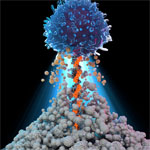News and Breakthroughs
Find the latest news and discoveries, as well highlights from Lurie Cancer Center’s programs and events through the links below. To learn more about our accomplishments and the people who make them possible, visit the Lurie Cancer Center news archive.
Visit our gallery to view a wide range of photos and videos for oncology professionals, cancer patients and families, cancer survivors, caregivers and community members.
 04.11.2025
04.11.2025The first week of April is Adolescent and Young Adult (AYA) Cancer Awareness Week—and if you've never heard of it, that's part of the problem. This year, 89,500 young people between the ages of 15 and 39 will be diagnosed with cancer in the United States.
 04.10.2025
04.10.2025Scientists have developed a novel, robust proteomics technique that can more accurately identify and spatially characterize thousands of proteins in single cells within human tissue samples, as detailed in a recent study published in Nature Communications.
 03.31.2025
03.31.2025A new study has identified a previously unobserved function of a protein found in the cell nuclei of all flora and fauna, playing a role promoting gene transcription.
 03.31.2025
03.31.2025Orland Park comedian Tim Cavanagh is back to laughing after Cavanagh back to laughing after pancreatic cancer nearly took his life.
 03.31.2025
03.31.2025On Sunday, June 1, Lurie Cancer Center and Northwestern Medicine will welcome cancer survivors and supporters to our 32nd Annual Cancer Survivors’ Celebration Walk & 5K!
 03.28.2025
03.28.2025Northwestern Medicine scientists have uncovered new details about the genetic structure of ovarian cancer cells, according to a study published in Advanced Science.
 03.27.2025
03.27.2025Cell death has been found to be a driving factor in glioblastoma progression, according to a Northwestern-Medicine-led study published in the Proceedings of the National Academy of Sciences.
 03.19.2025
03.19.2025A team of international scientists has developed a method to predict the risk of developing cancer from a blood disorder common in older adults, according to a study published in the journal Blood.
 03.13.2025
03.13.2025Northwestern Medicine investigators are steering CAR T-cell therapy research and treatment development to improve survival and quality of life for patients with cancer.
 03.10.2025
03.10.2025Circadian rhythms play a role in how quickly damaged muscles heal, according to a Northwestern Medicine study published in Science Advances.
 03.07.2025
03.07.2025The use of patient-reported outcomes during cancer treatment improved overall patient care, according to a trial published in Nature Medicine.
 03.05.2025
03.05.2025A new professorship honoring the late Ann Lurie, a transformative donor in the Northwester community and beyond, will support Hidayatullah G. Munshi, MD, ’02 GME, who in September was appointed chief of the Division of Hematology and Oncology in the Department of Medicine at Northwestern University Feinberg School of Medicine.
 03.05.2025
03.05.2025In this episode of Leukemia & Lymphoma Society's podcast, Timothy Pearman, PhD, explores the critical role of caregivers and care partners to a patient’s healthcare team. Dr. Pearman discusses the challenges caregivers face, including burnout, relationship stress, and issues surrounding sex and intimacy. He also offers effective communication strategies to address these challenges and shares ways healthcare professionals can better educate and support caregivers.
 02.27.2025
02.27.2025Northwestern Medicine scientists have discovered that inhibiting the GATA6 protein in mouse models of colon cancer reduced tumor growth and improved survival, underscoring the potential of a new therapeutic target for colon cancer, according to a recent study published in Science Advances.
 02.26.2025
02.26.2025Tara O. Henderson, MD, MPH, has been named the Founders’ Board Centennial Chair of Pediatrics, effective March 31.
 02.25.2025
02.25.2025The number of young people being diagnosed with cancer is on the rise. And while the treatments can be life-saving, years later they are life-altering.
 02.24.2025
02.24.2025Northwestern Medicine investigators have discovered unique genetic and structural changes in endothelial cells in the brain after disrupting the blood-brain barrier, which may inform new therapeutic targets that promote blood-brain barrier repair after neurovascular injuries, according to a recent study.
 02.11.2025
02.11.2025Northwestern Medicine investigators have developed a new avenue to reprogram compromised immune cells to work against tumors, according to a study published in Science Advances.
 02.03.2025
02.03.2025Northwestern Medicine scientists have uncovered a key pathway controlling tumor growth in B-cell lymphomas, according to a study published in the Journal of Clinical Investigation.
 01.24.2025
01.24.2025In this episode of the Big Ten Cancer Research Consortium’s podcast series, Lurie Cancer Center’s Kristin Smith discusses how she helps young adults with cancer navigate fertility preservation at Northwestern Medicine.
 01.22.2025
01.22.2025Our Year in Review highlights some of the most impactful stories from 2024, and the people who make them possible.
 01.17.2025
01.17.2025A fusion protein therapy may be an effective treatment option for cutaneous T-cell lymphomas, according to a multicenter clinical trial published in the Journal of Clinical Oncology.
 01.08.2025
01.08.2025New research from the lab of Issam Ben-Sahra, PhD, could rewrite textbooks on our understanding of cellular metabolism and potentially identify new targets for cancer and metabolic diseases such as obesity. The discovery, published in the journal Science, has been praised for its rigorous simplicity and underscores the importance of understanding the molecular mechanisms that underlie specific biological processes.
 01.08.2025
01.08.2025On Monday, January 20, we honor the life and legacy of Dr. Martin Luther King Jr. The Northwestern community will celebrate Dr. King with an expanded special commemoration including events and projects throughout the month.
 01.02.2025
01.02.2025Investigators from the laboratory of Ali Shilatifard, PhD, have developed a novel technique to precisely and efficiently study gene regulation, which may accelerate the development of new therapeutic strategies, according to a recent study published in Molecular Cell.
 12.20.2024
12.20.2024Scientists have uncovered new insights into the molecular players behind calcium channel regulation, a biological process that coordinates a wide array of physiological responses, according to a study published in the Proceedings of the National Academy of Sciences.
 12.20.2024
12.20.2024The use of active surveillance and watchful waiting increased from 13.2 percent in 2010 to 53.8 percent in 2020 among patients with intermediate-risk prostate cancer, according to a recent study published in JAMA.
 12.19.2024
12.19.2024The Breakthroughs podcast released 17 episodes in 2024, on topics ranging from biological age research to new insights in inflammation and microbiome science, as well as health equity research and community engagement efforts. Of the top three most downloaded episodes this year, there are two episodes that outline breakthrough T-cell research, shedding light on lupus and cancer treatment. Our third most-downloaded episode features a discussion on AI and digital pathology.
 12.17.2024
12.17.2024Northwestern Medicine scientists have developed a method for identifying reactive cysteines on peptide antigens within the immune system, a development which may prove useful in cancer immunotherapy, according to a study published in Nature Communications.
See more news in the article archive.
